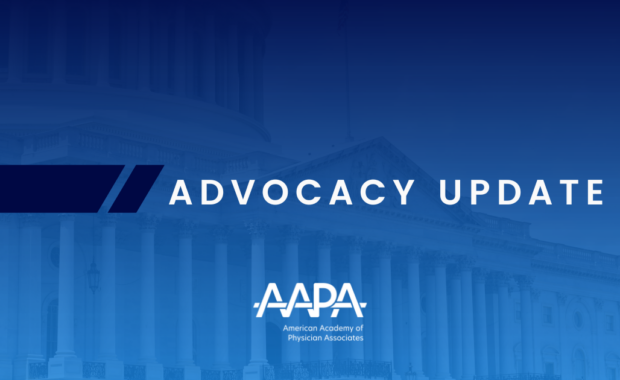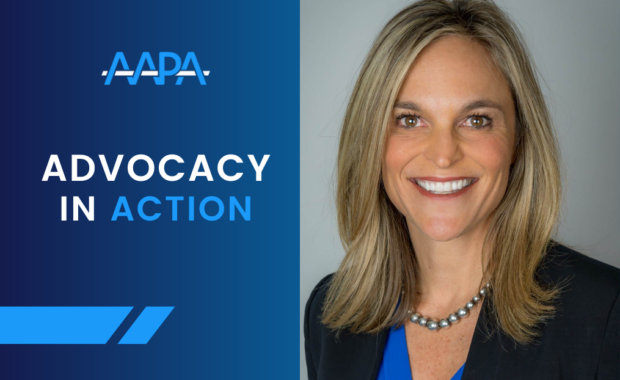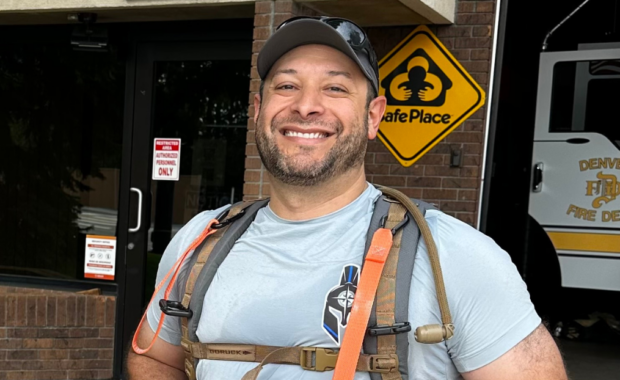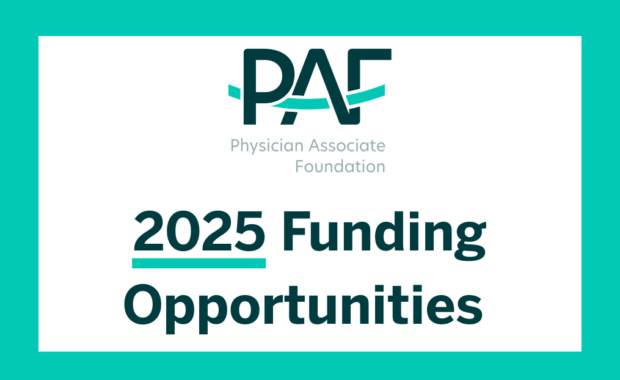Physician Associate Jenny Burke Responds to a Cardiac Arrest on the Ski Slope and in the Operating Room
‘[This] is going to stick with me for the rest of my career.’
April 4, 2025
By Jennifer Walker
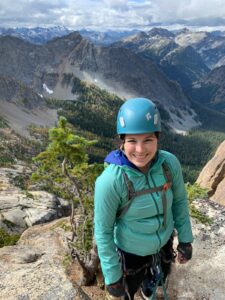
On December 28, 2024, Colin Anderson, age 48, stood at the top of the hill at the Hogadon Basin Ski Area in the remote community of Casper, Wyoming. After nearly three decades away from the slopes, he was excited to ski again. On his first run of the day, Anderson experienced a heart attack while skiing and collapsed at the end of the run. “The last thing I remember is pushing off at the top of the hill,” he said.
That same day, physician associate Jenny Burke was also on the hill, hanging signs as a candidate-in-training with the Casper Mountain Ski Patrol. “We got a call over the radio that there was a man down in the snow,” she said. Burke and the team of volunteer patrollers quickly sprang into action to provide CPR and life-saving interventions until the ambulance and helicopter arrived to provide further care and transport Anderson to the hospital.
“The cardiac chain of survival is early recognition, good compressions, early defibrillation with an automatic external defibrillator (AED), and early access to advanced life support,” Burke said. “Basically, this was a series of perfect events where everybody knew what they needed to do and got started right away.”
Burke, who is also a cardiothoracic surgery PA, was able to assist in the operating room during Anderson’s open-heart surgery at Banner Wyoming Medical Center. The survival rate for out-of-hospital cardiac arrests is around 10%. Anderson not only survived, but he did so without experiencing common complications, including kidney and neurological damage.
When Life Takes Unexpected Turns
After learning to ski at 20 years old, PA Burke started backcountry skiing in unpatrolled areas and even skied down volcanoes in the spring—a common activity in Washington, where she grew up. She expected to build a life in her home state, near her family and an abundance of ski facilities. Then she went to Casper for a four-week medical rotation as part of her PA program at the University of Washington MEDEX. There, she fell in love with a cowboy, who is now her fiancé, and changed her plans. After moving to Wyoming, Burke, who was an EMT for six years before becoming a PA, decided to join the local ski patrol to give back to her new community.
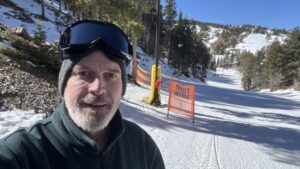
Burke also didn’t see herself working in cardiothoracic surgery. She was fully set on working in the emergency department, a natural extension of her EMT training. She even had a fellowship in the field lined up for after graduation. Then Burke did a rotation in cardiothoracic surgery to fulfill a surgical rotation requirement. “You have to have a really good team to do heart surgery. Everyone has to work together and be very meticulous,” she said. “I got to that rotation and it was a shock to realize that this is actually what I want to do. I totally shifted gears.”
At Banner Wyoming Medical Center, Burke especially likes her role during coronary artery bypass graft surgeries, a type of open-heart surgery for patients who have a blocked artery. “Working as a PA in heart surgery, you have your own procedure that you’re performing while the surgeon is up at the chest,” she said. “You’re practicing at the highest scope of your practice.”

During this surgery, Burke takes the lead on the endoscopic vein harvest procedure, which involves removing a vein from the patient’s leg. The surgeon then uses this vein to create a new pathway for blood to bypass the blocked artery and reach the heart. Burke performed this procedure for Anderson only five days after responding to his cardiac arrest on the ski slope.
Life-Saving Interventions on the Ski Slope and at the Hospital
As a candidate with the ski patrol for the 2024-25 season, Burke is required to work eight days on the hill. Her team got the call about Anderson on her second day. By then, bystanders were already responding: A skier who saw Anderson on the ground called for help, which alerted another bystander (who happened to be a urologist) to respond, assess the situation, and start chest compressions on Anderson.
Two patrollers skied to the bottom of the hill to respond while Burke and another patroller returned to the ski hut to grab an AED and the Lucas chest compression system. Burke and her colleague grabbed the supplies and drove to the bottom of the hill in a utility task vehicle (UTV).
By then, the two first-responders—one of whom is a paramedic-in-training—had taken over CPR. Burke grabbed the AED, used to restore the heartbeat, and applied the pads to Anderson’s chest. No shock was advised. She did two more assessments, both of which indicated a shock was needed. By the fourth assessment, Anderson had a pulse.

The team loaded Anderson into the back of the UTV for the trip up the hill to the parking lot, where an ambulance and a helicopter would convene to provide the next level of care. “Because of how remote Wyoming is and how icy and bumpy the roads can get, we always call a helicopter,” Burke said. The UTV drive was bumpy, causing the AED pads to get wet and malfunction. Burke tried to find a pulse on Anderson, but the rough ride made this a challenge. “When in doubt, do CPR,” she said. Burke continued to do this for the duration of the trip. Other than making an occasional noise, Anderson remained unresponsive.
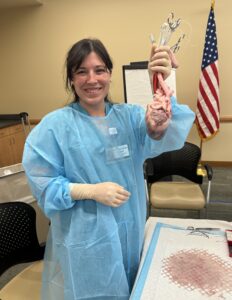
When they reached the parking lot, the Sheriff’s Department had begun setting up a landing zone for the helicopter, and the ambulance had arrived. Paramedics loaded Anderson onto the ambulance to make sure he was stable before flying to the hospital.
Burke next saw Anderson again at the hospital. On January 2, 2025, during his open-heart surgery, Burke removed the vein in Anderson’s leg. His surgery was a success, and he was able to leave the hospital five days later.
At the hospital, Anderson said that Burke was friendly, as well as knowledgeable, particularly when it came to removing the vein to be used for the bypass surgery. “When they unwrapped my leg after the surgery, I was expecting to see a big, long scar,” he said. “But there was just a small incision at the top and bottom of my calf where the vein was removed. I mentioned my surprise at how it was taken out to Jenny [Burke], and she jokingly said, ‘That’s why you had me do it!’ You can tell she really likes what she does and thinks it’s pretty cool getting to do part of the surgery.”
Two months later, after getting cleared by Burke and his surgeon, Anderson resumed skiing at Hogadon with his new equipment.
Burke sees this experience as a defining moment in her young career. In ski patrol training, she had been a part of conversations about what the volunteer patrollers would do if there was a cardiac arrest—an emergency that hadn’t happened at Hogadon in more than a decade.
“I thought with the time it would take us to get to the person and then trying to get them up the hill, there’s no way somebody would survive this,” she said. “Then to have it happen with Colin on my second patrol day and to not only be a part of the cardiac arrest but also the surgery afterward—that’s going to stick with me for the rest of my career.”
You May Also Like
Nonprofit Director and Future PA Delivers Critical Care During Natural Disaster
PA Olivia Bell Celebrated the 25th Anniversary of Her Open-Heart Surgery by Running the New York City Marathon
During Her First Marathon, PA Melissa Volpe Stopped to Save the Life of a Fellow Runner
Thank you for reading AAPA’s News Central
You have 2 articles left this month. Create a free account to read more stories, or become a member for more access to exclusive benefits! Already have an account? Log in.
